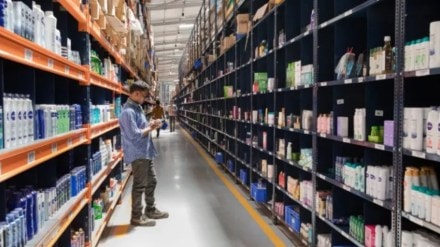BigBasket was a late-comer in quick commerce as it entered the race as late as April, 2022. But the Tata-backed e-retailer’s q-commerce vertical BBNow hasn’t taken much time in coming up to speed with other q-commerce players, some of whom launched their services in the first six months of 2021.
Sample this: Till sometime back, BBNow’s contribution to the total revenue of BigBasket was just about 30%. That has already gone up to 50%. And, Vipul Parekh, co-founder and chief marketing officer, BigBasket, says he expects it to go up to 65% in a year’s time.
Parekh told FE he expects BBNow to turn profitable by March 2025, which in turn would see the entire business portfolio of BigBasket turning profitable. The company maintains that all its verticals are profitable barring BBNow.
Currently, the company’s slotted delivery business is profitable, while BBNow is contributional margin positive. “BBNow is contributional margin positive. This means, it covers all operating costs but does not cover marketing costs and corporate expenses. We expect it will cover all of that also by March 2025,” Parekh said. While he did not share overall numbers, BigBasket’s B2C business saw its losses widen to Rs 1,535 crore in FY23 from Rs 812 crore in the year before that.
At present, BBNow has 400 dark stores in 35 cities. It plans to add 100 more such stores this year. Plans are also to expand to 5-10 cities next year — within the cities where BigBasket is already offering slotted deliveries.
“Both slotted business and quick commerce business are growing. But q-commerce is growing faster, as consumers are ready to pay a small price for the convenience that they get, just like in the food delivery space,” Parekh added.
He also said that BBNow has an edge over other players in the segment. “We are present in close to 300 cities for slotted delivery. Having this network, we can launch quick commerce whenever we want or continue with slotted delivery, which is also growing. We have a pan-national supply chain network,” he said.
Talking about expansion beyond Tier 1, Parekh said, “In the top 30 Tier 2 markets, there is a market for quick commerce. They are adapting quick commerce very quickly. BBNow will become more important than slotted deliveries. But, beyond that, in Tier 2 and 3 price comes into play. Quick commerce may not work that well there”. The company has around 78 dark stores in Tier 2 cities and 2 stores in Tier 3, 4 overall.
Parekh said that BBNow’s fresh network is a huge advantage. “We can buy from 40,000 farmers, we have our collection centres which are about 70. Our entire fresh category comes directly from farms, which is mostly not the case with other players. This gives us more control over quality and on gross margin,” he added.
Fresh (fruits and vegetables) is also the highest gross margin category in q-commerce. And, almost 25% of BBNow’s revenue comes from fresh. “But one needs to manage it well, else you will have a lot of returns,” he said. BBNow claims to have the lowest returns overall in the category in the q-commerce industry. It sees about an overall 1.2% returns and 0.5 write-offs (damaged, expired products) as against industry standards, which is around 2-3%.
According to Parekh, competition has always existed in the online grocery segment, however, going ahead it will get more challenging for every player. “Slotted delivery is fought on price and q-commerce is fought on coverage and assortment. This will become hygiene very soon. We have to see how the industry shapes up after that. But, with competition, it’s going to be challenging for all, in terms of unit economics and scale,” he said.
Around 35-37% of BBNow’s total revenue comes from its private-label products. Parekh said that there is higher customer attention and higher gross margin in private labels. “Therefore profitability is much easier in what is a tough and competitive space,” he added.
BigBasket is also piloting its offline model in Bengaluru and Hyderabad, which will be used for front-end and delivery. While Parekh didn’t reveal further details on that, he said that the response has been good so far. “If we decide to expand it, it will be done next year,” he said.
Talking about category expansion, he said, “The problem that quick commerce participants will have is that one needs to have an optimum size of dark stores. You can’t carry 100,000 SKUs (stock-keeping units) in 6,000 square feet dark stores”. The company carries around 30,000 SKUs in grocery under its slotted delivery and 8,000-10,000 SKUs in quick commerce.
In addition to general merchandise products such as kitchenware, small appliances, the company has expanded beauty and smaller appliances to its quick commerce arm. “We are introducing more and more smaller electronics products such as chargers, keyboards, speakers etc,” he said.
Parekh added that smaller electronics was a category that BigBasket had started introducing in slotted deliveries, but now has become more popular under the quick commerce category.
He said that quick commerce will scale till it reaches all of food delivery audience. “The food delivery players scaled quite rapidly for two or four years and now they are growing at about 10-12%. We will also run out of affluent, Tier 1 customers. Until that happens, we will continue to grow at the same pace,” he said.
